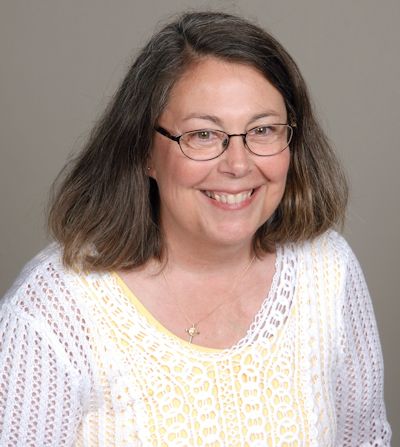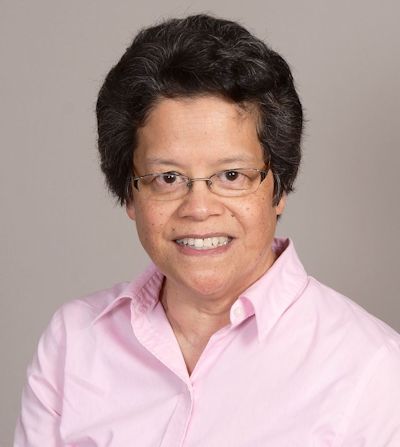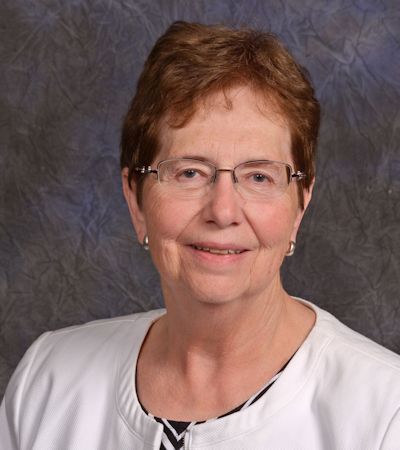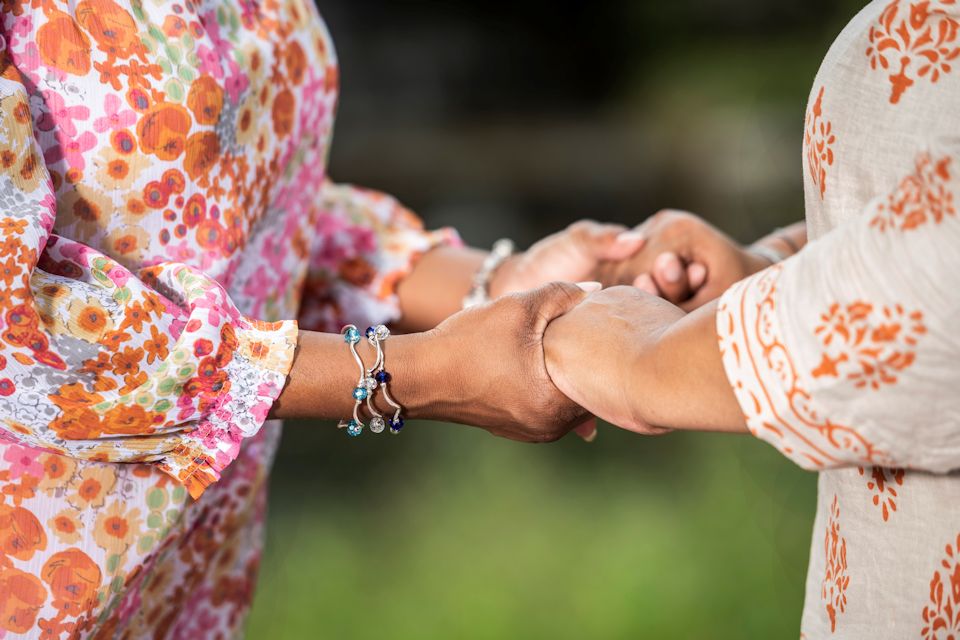Three more Michigan clergy -- Sue Pethoud, Jennifer Jue, and Molly Turner -- talk about the women who encouraged their call to ministry and supported them on their faith journeys.
The 1956 General Conference of The Methodist Church granted full clergy rights to women. For the past 66 years, God has called women into the ordained ministry of the Elder, the ministry of the Deacon since 1996. There have been triumphs and struggles along the way. Today about 30% of clergy in The United Methodist Church are women.
Through those years, family members, friends, teachers, and colleagues have provided inspiration, encouragement, and support for women answering God's call.
In this second of two features, three clergy women of The Michigan Conference women talk about their spiritual journeys, with particular attention to the sisters in faith who walked beside them. They also provide counsel to those who are feeling God's nudge today.
Rev. Sue Pethoud, Deacon serving Cass Community Social Services and Cass Community UMC

My mother was the most influential woman in my life. She was my protector, encourager, cheerleader, and advocate. She made sure we were brought up in the church and had every opportunity (choir, youth group, Sunday school). I had three female math teachers, two in elementary school and one in middle school. All three saw potential and encouraged me to do something in the field of mathematics as an adult.
Three women encouraged me in answering God's call to ministry: the Rev. Loretta Job, a UM deacon, the Rev. Sherry Parker-Lewis, a UM elder, and the Rev. Jessicah Duckworth, a Lutheran pastor and professor at Wesley Theological Seminary. Loretta was a friend, first and foremost, who walked with me during the discernment process. As one who had taught math for 30 years, changing directions and attending seminary at the age of 50+ seemed pretty far-fetched.
Loretta helped me understand that my call to ministry had been there much longer than I had realized and that I was already living into that call with the things I was doing with and for the church. I was leading Brighton FUMC's youth ASP trip, local mission activities, working with the high school youth group, and singing in the choir at that time. Loretta encouraged me to begin a program at Wesley Theological Seminary called Equipping Lay Ministry, which would lead to United Methodist certification in youth ministry. I keep my certification current still. That was ultimately the key to making the leap to ordained ministry.
Sherry was the pastor at Brighton FUMC as I was struggling with my call. Before following her call to ordained ministry, she had been a teacher, though not for as long as I had been. So I think she had a bit of an understanding of where I was coming from. I was called to Sherry's office after a very difficult summer with some unusual issues on both mission trips that I had led. It was like being sent to see the principal! After we discussed the issues that had taken place and made recommendations for some things to be implemented so they would not happen in the future, she handed me a book, The Christian as Minister. She simply said, "I think you are called to ordained ministry."
Jessicah was one of my professors in Wesley Seminary's Equipping Lay Ministry program. From the get-go in that program, the professors and other students kept telling me that my call was to ordained ministry rather than ministry as a layperson. I kept pushing that all aside until a lunch break during a youth ministry class Jessicah was teaching. I don't know how it came up, but the subject of the lunchtime discussion was practical theology. She said something to the effect that deacons in the United Methodist Church are often the practical theologians of the world and then explained what she meant. I had never heard the term but knew I was being called to work with youth and those in need, both teaching and serving.
The role of a UM deacon is to connect the church and the world. Finally, I had the answer to the question that I had struggled with for a long time. When I was ordained, I sent her a note thanking her for steering me in the right direction and naming my theology.
Many other women have offered support in my ministry. However, at the top of the list is the Rev. Faith Fowler. She was there when I got a "not yet" at the district committee level years ago. She was there to see me off for my commissioning and ordination interviews. Faith gave me my first preaching opportunity, my first worship leadership opportunity, and welcomed me to urban ministry as we checked out a new-to-us building and found a potential squatter. She hired me to work at Cass while I was still in seminary and challenged me to be a better minister. When the day-to-day gets overwhelming, Faith is there to offer support. When there is something to celebrate, she's there for that, too. Faith and I work as a team both at Cass Community Social Services and Cass Community UMC. She is my boss, pastor, colleague, and friend.
Judy Harnish, my covenant group (all female deacons), and a plethora of other clergywomen offer support when things are rough and join me in celebrating when things go well. Their support keeps me going on the tough days and fills my cup to overflowing when things are going well.
"Listen!" That's what I would say to women who hear God's call today. Follow the call that God has put on your heart. It's not an easy road, but it is a road filled with great things and great opportunities to share God's love with those God will put in your path. I never imagined that I would carry a Bible as part of the tools of my trade, maintain an apartment in Detroit, or work with and for those in need in the City, but here I am. So, whether you're 20 or 50, if you feel God's call on your life, figure out how to make it work and follow that call.
Rev. Jennifer Jue, Pastor of Jackson Cooperative Parish

Growing up in United Methodist churches of the California-Nevada Conference, my father, the Rev. Jun Jue, was active in the Chinese clergy caucus during my youth. As a result, I was blessed to meet Chinese American ordained ministers, including the Rev. Wilbur Choy, who was elected the first Asian American Bishop in The United Methodist Church (1972). At Chinese American clergy meetings, I met the Rev. Mamie Ko, and her presence among a large group of male clergy served as a strong role model and witness that God calls women of all ethnic/racial backgrounds to serve God's Church.
The Samaritan woman at the well (John 4:1-26, 39-42) has always inspired me in my call to ministry. I especially notice her boldness in talking with Jesus and accepting Jesus' gift of living water (eternal life) and then sharing her faith and witness with others. Jesus calls women, including women of different ethnic and racial backgrounds, to be witnesses, evangelists, preachers, and pastors.
When I heard God's call to ordained ministry and seminary, I was a mother of school-age children, and my first reaction was, "I can't do it." I was blessed with several women pastors who shared their personal experiences and challenges, and the main point was, "If God calls you, God will see you through." As a full-time seminary student, mother, and wife, I kept my focus on God's call and prayer. I formed a strong support network with other women seminarians, women professors, and Bishop Sharon Rader (then the bishop in residence at Garrett-Evangelical Theological Seminary). These women of deep faith served as mentors, encouragers, and supporters all along the journey towards ordained ministry and while I served as an appointed pastor of The United Methodist Church.
As an ethnic minority woman clergy, I face joys and challenges in ministry every day. I rely on my women pastor friends for support and encouragement and prayer. During my seminary years and commissioning and ordination process years, I relied on my pastor mentor and friend, the Rev. Molly Turner. Molly served as a coach and guide, almost like a "DS hotline," when I faced major pastoral leadership challenges and problems and when I hit the point of almost giving up. My women pastor friends are my lifeline, surrounding me with God's unconditional love and grace.
When God nudged me towards ordained ministry, my first reaction was, "I can't do it." My advice to others would be to find women leaders, pastors, deacons, chaplains, all in ministry, and talk with them. Share your questions and doubts and concerns, and pray together about God's call on your life. God is calling you. Listen to God's nudging. God will make a way.
Rev. Molly Turner, Retired pastor, Michigan Conference

I grew up attending Jackson First United Methodist Church. My parents were very active in the church in committee work, assisting in youth group, and teaching 3rd grade for many years. My mother, Elizabeth Conklin, was an inspiration for me. In 1941 she had a business degree and worked as the head office manager and accountant for a large Power Company in Pennsylvania. However, when she met and married my father, Bill Conklin, the company policy said that no woman could work at that company if they were married. As a result, my parents moved back to Michigan, my father's home state. Mother had always wanted to professionally train for working in the church. However, coming from a family of 12 children, she chose to work and give additional income to her parents.
My mother attended the Wesleyan Services Guild, an evening circle of the Women's Society of Christian Women (WSCS). I often went with her and sat on the floor listening to these exciting women talk about faith and justice issues. Throughout the years, the WSCS and United Methodist Women (UMW) continued to be really helpful and supportive of me.
I heard God's call to Christian Ministry in 1956, the year that the General Conference approved full clergy rights for women. The call came while sitting around the evening campfire at Wesley Woods Camp. I was ten years old. When I returned home, I made an appointment to tell the church staff about my call to ordained ministry. Staff members heard me, but they suggested that Christian Education or being a missionary would be better for me. When I told my mother about this, she quickly said, "If you are called by God, all will be ok. It will work out. Just trust God." Over the next few years, my mother had to remind me of that several times.
The one person who rejoiced at this call was my fifth-grade Sunday school teacher, Mrs. Lydia Runkle. She was the wife of the Rev. Emil Runkle, one of the church's pastors at that time. Mrs. Runkle went out of her way to work with me and support me every week and for years to come.
In my days at Kalamazoo College, the school required one term doing a career service. The Rev. Stanley Buck was my District Superintendent. I had served with Mrs. "Bunny" Buck as a camp counselor at Lake Louise, and she was very supportive of me. When I contacted Dr. Buck, he suggested the college internship be at Jackson Haven Methodist Church with the Rev John Sorensen. That experience as an assistant pastor was very helpful.
I shared with Rev. Sorensen that I wanted to be ordained as a full member of the Annual Conference. He asked me if I had ever met a woman pastor. I said no. Rev. Sorensen told me there were women serving congregations. He explained that the Methodist Protestant Church in 1920 had granted the right to preach to women who were licensed as local pastors. He added that in 1924, the Church decided to ordain women as local deacons or local elders. Rev. Sorensen then set up phone calls and a car trip for me to meet a few of these women.
I visited the Rev. Leona Winegarden, who we would later follow at the Manton Church, the Rev. Leah Garchow, and others. Many of the licensed local pastor women in this category met all the requirements for full ordination, and several I met had full doctorate degrees from United Methodist seminaries. But full membership and orders for women were not to come until the 1956 General Conference.
This experience helped me see my sister pastors' very rich background. I gave and felt support from several of them. These brave and interesting women made me not feel alone. As more women began seeking full ordination and rights in the United Methodist Church, we started meeting together and helping each other. I realized I was standing on the shoulders of these sisters who were doing wonderful ministries in times of joy and challenges.
One particular lay woman stands out. Dr. Katherine Wilcox was a clinical psychologist in practice with her husband, Dr. Paul Wilcox, in Traverse City. After seminary training, my husband and I served Manton, Fife Lake, South Boardman, and East Boardman churches in our first appointment. Kay contacted me soon after we moved in. She was a lay person who had sought to be fully ordained at a time earlier in her life. At the ordination service, she was told she could only be locally ordained. She left the service.
Kay was very justice-oriented. She served on the General Board of Missions and worked with others on the National Division who dealt with various mission and social issues. Kay taught me about church process on all levels of the church. She invited me to many meetings across the conference, and I learned how to write General and Local Annual Conference legislation. Dr. Kay Wilcox worked on writing the proposals for the General Commission on Status and Role of Women and its establishment within the West Michigan Conference. She shared her ideas, library, and many a meal at her home with me. She taught me so much.
I was ordained as a deacon in 1969 and a full elder in 1972.
In these years, I met the Rev. Judy Craig. We were at the first Clergywomen's Consultation and happened to share a meal together. We talked for well over an hour. I was so happy and excited when she was elected as bishop and especially when I learned she was to serve the Michigan Area. I was very pleased that she asked me to serve as a District Superintendent of the Central District. We remained friends for years.
Michigan has put forth several women for possible election as bishop. We have had the rich heritage of six women bishops who were either elected from Michigan or served here. They are Bishop Marjorie Swank Matthew 1980 (year of election); Bishop Judith Craig 1984; Bishop Sharon Zimmerman Rader 1992; Bishop Linda Lee 2000; Bishop Deborah Kiesey 2004 and Bishop Laurie Haller 2016. I thank all these women who have taught me and inspired me so much.
I was called when I was ten years old. Today, God continues to call women of all ages. When God calls you, know that many have gone before you and many want to welcome you into the joys and challenges of ministry. My word to women is, "If you are called by God, all will be ok. It will work out. Just trust God."
Last Updated on May 3, 2022

